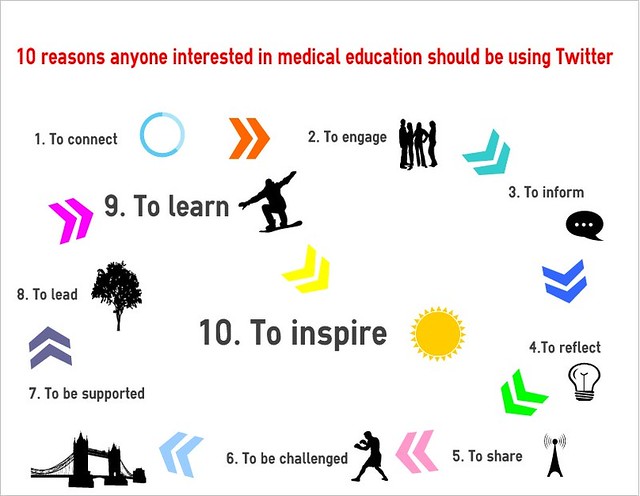1. Update your profile.
Say who you are and why you are using Twitter. If you have a blog or a webpage somewhere that explains more about who you are then link to this. It will help people to know who you are and to have a context for what you say. And add a picture. It doesn't have to be you, it could be something abstract, but it will give people a sense of who you are.
2. Follow people.
Who? Well, it depends on your interests but if you are interested in medical education then I can recommend a few ways to find people to follow. I have pulled together a list of people who tweet quite a lot about medical education. You can find it here. And with a slightly different flavour you can find another list by Jonny Tomlinson here. Jonny is a GP in London who is passionate about inequalities in health, and helping others to understand their impact on the lives of the patients in his practice. He tweets as @mellojonny and I recommend following him strongly.How I decide who to follow? I look at their recent tweets and if they are saying interesting things or sharing interesting content then I follow them. And then I will often share what I see them saying. The simplest way to do that is to click on the 'retweet' button which then rebroadcasts that tweet so that people who are following you will see it. There are other ways to retweet. You can copy and paste what the other person has said into a tweet. But it is expected that you will try to attribute thoughts and ideas to those who they came from so it is customary to see 'RT' for retweet added to the tweet. There are a few other variations of this... MT for modified tweet, if you change what the first person has said by deleting part for example. And HT for 'had tip' or 'heard through'. It's a way of thanking someone else for bringing you some information. Don't worry if that is confusing. You can just use the RT button and everything will be taken care off.
3. Tweet!
Time to get going! What should you say? Don't think about it too much. Just share what you think will be useful to others. Have you read something interesting to day? What are your thoughts about it? Don't under-estimate how knowing that you think a certain paper is worth having a look at is valuable to others. There is a lot of information out there and your efforts to highlight some of the best bits will be appreciated by others.Should you tweet about matters that are not about your work or study? That's up to you. My personal choice is to share only very limited information about my personal life. I like to have my privacy. But sometimes I will mention the music I am listening to, or a holiday snap. I have no hard and fast rules about this. But I do have a very clear rule that I never tweet about my clinical work. I don't even say if I am working in the practice on a given day. This works well for me.
If you have any questions or tips for others, please post them in the comments. I've written this quickly so I might not have been clear and I might have left some important topics out.
Remember it is fun. If it's not then step away from the computer (or the smart phone!)

No comments:
Post a Comment